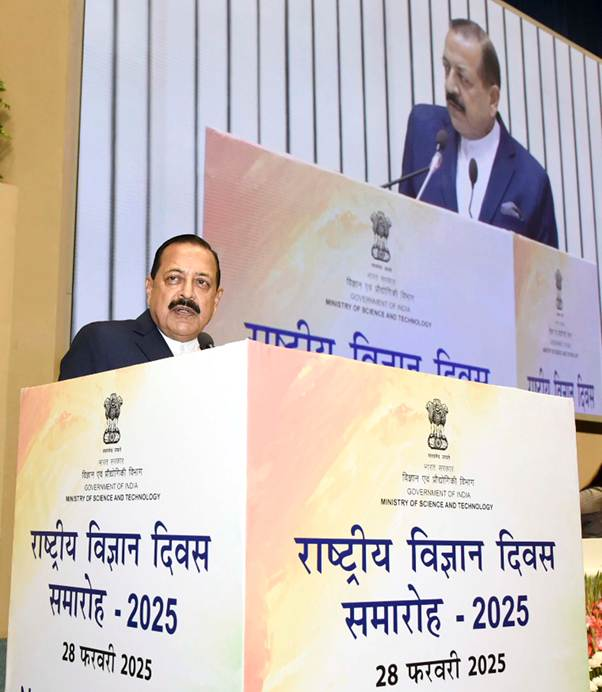India's Unprecedented Investment in Science and Innovation: Dr Jitendra Singh Highlights Quantum Budgetary Increase
Dr. Singh detailed the remarkable growth in financial allocations to scientific research and innovation over the past decade.

- Country:
- India
Union Minister Dr. Jitendra Singh reaffirmed the Government’s unwavering commitment to the progress of Science, Technology, and Innovation, emphasizing a significant quantum budgetary increase for key science departments. He attributed this growth to the visionary leadership of Prime Minister Narendra Modi, calling it a testament to his patronage of scientific advancement and innovation. The Minister made these remarks at the National Science Day 2025 celebrations held at Vigyan Bhavan, New Delhi.
Unprecedented Budgetary Growth for Science and Innovation
Dr. Singh detailed the remarkable growth in financial allocations to scientific research and innovation over the past decade. The Department of Science and Technology (DST) witnessed a staggering increase from ₹2,777 crore in 2013-14 to ₹28,509 crore in 2024-25, marking a 926% rise. The Department of Science and Industrial Research (DSIR) saw its budget soar from ₹2,013 crore in 2013-14 to ₹6,658 crore in 2024-25, reflecting a 230% increase. Meanwhile, the Department of Space (DOS) grew from ₹5,615 crore in 2013-14 to ₹13,416 crore in 2024-25, a 139% surge.
India’s Celebration of Scientific Excellence
Prime Minister Modi’s vision for a vibrant scientific community was highlighted, with Dr. Singh recalling Modi’s encouragement, through 'Mann Ki Baat,' to celebrate National Science Day with enthusiasm. The event marks the discovery of the Raman Effect by C.V. Raman in 1928, a landmark achievement in light scattering that won him the Nobel Prize in Physics in 1930.
Launch of New Initiatives in Science and Technology
During the event, Dr. Singh launched the DST's Electric Vehicle Solutions initiative, a collaborative effort involving startups, the Ministry of Heavy Industries, and the Automotive Component Manufacturers Association (ACMA) to boost local component manufacturing.
Further reinforcing India’s scientific prowess, Dr. Singh announced the establishment of nine new institutes under the NIDHI-iTBIs (Inclusive Technology Business Incubators), adding to the existing 50 institutes:
- National Engineering College, Kovilpatti, Tamil Nadu
- GITAM, Visakhapatnam, Andhra Pradesh
- Indian Institute of Management, Jammu, J&K
- Sri Sri University, Cuttack, Odisha
- Sanskriti University, Mathura, Uttar Pradesh
- AIIMS, Patna, Bihar
- Sona College of Technology, Salem, Tamil Nadu
- Assam Down Town University, Assam
- Sangam University, Bhilwara, Rajasthan
Additionally, an MoU was exchanged between IIT Kanpur and HAB Biomass Pvt. Ltd. for a Green Corrosion Inhibitor from manure, developed by the SHRI Cell of DST. A major technology transfer agreement was also formalized between CSIR-NBRI and Ankur Seeds, Nagpur.
Empowering Youth for Viksit Bharat@2047
Dr. Singh emphasized the theme of this year’s celebration, “Empowering Indian Youth for Global Leadership in Science & Innovation for Viksit Bharat.” He dedicated the National Science Day to young scientists, encouraging capacity building and positioning them as architects of India’s future.
India’s emergence as the third-largest startup ecosystem was also highlighted, with an increasing number of youth-led deep-tech startups making global contributions in fields like cybersecurity, data privacy, sustainable energy, healthcare advancements, and smart manufacturing.
Strategic Investments in Research and Innovation
Further strengthening India's scientific ecosystem, the government announced additional investments:
- ₹1,000 crore venture capital fund exclusively for the space sector, fostering nearly 300 space startups and positioning India as a global space industry leader.
- ₹2,000 crore allocated for Mission Mausam, a national program aimed at enhancing weather forecasting capabilities.
- Launch of the Anusandhan National Research Fund (NRF) with a ₹50,000 crore corpus, ensuring research excellence drives India’s scientific advancements.
- Nine more universities under PURSE were granted ₹75 crore to support diverse scientific themes across different geographical regions:
- Central University of South Bihar
- Central University of Tamil Nadu
- Guru Ghasidas Vishwavidyalaya, Chhattisgarh
- Hemvati Nandan Bahuguna Garhwal University, Uttarakhand
- Maharshi Dayanand University, Rohtak, Haryana
- Punjab Engineering College, Chandigarh
- Rashtrasant Tukadoji Maharaj Nagpur University, Maharashtra
- Tezpur University, Assam
- Veer Bahadur Singh Purvanchal University, Uttar Pradesh
India’s Global Recognition in Science
Dr. Singh highlighted India's leap in the Global Innovation Index, rising from 80th to 39th position in just ten years. Additionally, a survey found that 5,352 Indian scientists feature among the top 2% globally.
Key scientific breakthroughs that have bolstered India’s international reputation were also celebrated, including:
- Chandrayaan-3’s successful landing on the Moon’s South Pole, making India the first nation to achieve this feat.
- Launch of ISRO’s SPADEX mission on December 30, 2024, a pioneering initiative in spacecraft rendezvous, docking, and undocking.
- Advancements in quantum technology, with Indian startups leading innovations in quantum computing, communication, and cryptography.
Strengthening Public-Private Collaboration
Dr. Singh reiterated the government’s focus on fostering an enabling environment for scientific research, aligning R&D with industry needs. The Ministry of Science and Technology is committed to ensuring that innovations transition from “lab to land,” benefiting local communities while strengthening India’s global scientific leadership.
Distinguished Attendees
The event saw participation from eminent scientists and officials, including:
- Prof. A.K. Sood, Principal Scientific Advisor to the Government of India
- Dr. N. Kalaiselvi, DG-CSIR & Secretary, DSIR
- Prof. Ashutosh Sharma, President, INSA
- Prof. Abhay Karandikar, Secretary, DST
- Dr. Rajesh S. Gokhale, Secretary, DBT
- Sh. V. Narayanan, Chairman, ISRO & Secretary, Department of Space
- Dr. Rashmi Sharma, Head, NCSTC
School and college students from 22 states across India also participated in the celebrations online.
Conclusion
Dr. Singh concluded by reaffirming the government’s commitment to ‘Atmanirbhar Bharat,’ championing indigenous innovations and scientific excellence. As India propels towards Viksit Bharat@2047, its strategic investments and unwavering commitment to research and development will cement its place as a global leader in science and innovation.
- READ MORE ON:
- Dr Jitendra Singh










